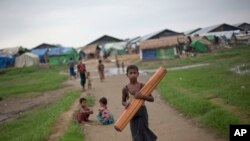U.N. and other aid agencies are increasing humanitarian operations in Myanmar in response to a growing displacement crisis there.
The number of displaced people in Myanmar has doubled to more than 800,000 since the military junta seized power from the democratically elected government a year ago.
The U.N. Refugee Agency says that number is likely to rise in the coming weeks and months, as fighting and armed conflict intensify across the country.
UNHCR spokesman Matthew Saltmarsh says his agency and others are increasing emergency aid in support of as many of the displaced as possible. He says they are living under precarious conditions and have pressing humanitarian needs.
“Humanitarian access in many parts of Myanmar remains restricted due to insecurity, roadblocks and challenges in obtaining access approvals,” Saltmarsh said. “As a result, host communities and local responders continue to play a leading role in assisting displaced populations—demonstrating solidarity with each other by donating what they can.”
The U.N. says hostility toward the military has grown since the coup and violence is spreading across the country. U.N. human rights chief Michelle Bachelet warns Myanmar is heading toward civil war and the escalating conflict is threatening regional stability.
The U.N. and other international aid agencies have a somewhat fluid, ambiguous relationship with the country’s military leadership.
Saltmarsh stresses the need for organizations to have access, to get aid into the country, and to ensure that humanitarian staff can work freely.
That access comes and goes, he says. For example, agencies have only been able to reach some 600,000 stateless Rohingya Muslims in Rakhine state sporadically. He adds development projects for their benefit have been relatively rare.
“Life there is extremely difficult. The questions about pathways to citizenship still remain. This is a stateless population,” Saltmarsh said. “As of course you all know, there is almost a million Rohingya who fled several years ago across the border to Bangladesh and the situation on the ground in Rakhine state remains extremely challenging.”
Some 200 UNHCR staff work in 10 locations across Myanmar. Saltmarsh says the agency remains committed to providing humanitarian assistance despite the difficulties.











